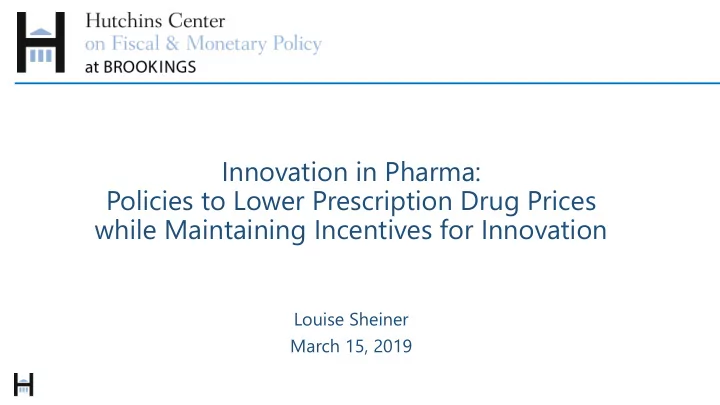

Innovation in Pharma: Policies to Lower Prescription Drug Prices while Maintaining Incentives for Innovation Louise Sheiner March 15, 2019
Motivation Lots of policy discussion surrounding prescription drug prices. Difficult to analyze welfare consequences of policies that lower drug prices but also lower return to innovation in Pharma. Arnold Foundation asked us if we could put together a conference on policies that avoid this tradeoff. Intent is to hash out these ideas with all of you. Participation encouraged!
Three panels this morning (1) Are current incentives too high? Too low? (2) In- depth discussion of Louisiana’s approach to purchasing Hep C treatments. (3) Do current incentives distort R&D in a way that lowers social welfare? What policy changes could help?
Are incentives too high or too low? Too high: • Willingness-to-pay at the margin>consumer value. (Due to mandated drug coverage, doctor preferences, insurance coverage, etc.) • Process of developing drugs limited by # scientists, NIH funding, non-$ motivation. Higher rewards don’t lead to better drugs, just to rents and high prices. Too low: • Patent system/exclusive marketing rights are time limited. How should we think about me-too drugs?
Louisiana’s approach to Hep C treatment High prices allow for return on investment, but lead to underprovision of treatment. Canonical solution: two-part pricing. Upfront fee provides return on investment, then sell drugs at marginal production cost. Treat more people for same/not much more $. Louisiana is using a variant of this. If Hep C treatment lowers medical costs for treated patients in long term at current prices, why is this an issue? • State balanced budget requirements. • Payers might not see savings: switches in insurers over time — across private carriers, from private and Medicaid to Medicare.
Are current incentives distortionary? How do time limits affect investment decisions? What are policy implications?
Next Steps We will circulate Chatham House rules summary of discussion (No identification of speakers, attendees, or affiliations). We will consider holding a public event on these issues.
Recommend
More recommend